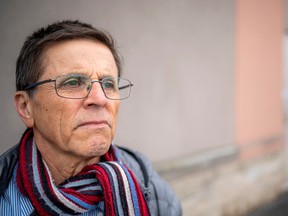In the fall, Hassan Diab taught a course that referenced his own Canadian extradition case. Carleton said this week he no longer works there

Hassan Diab, the Ottawa sociology professor who was convicted in absentia in 2023 of a deadly synagogue bombing in France, is “not currently employed” at Carleton University, the school says.
Recommended Videos
In the fall, Diab taught a course at Carleton called Social Justice in Action, using his own Canadian extradition case in his teachings. His position drew the ire of the Jewish community in Canada and beyond, with B’nai Brith Canada calling on Carleton to fire him.
“The university has ignored B’nai Brith’s formal request to terminate his position, allowing Diab to remain in a position of authority over students,” the Jewish advocacy group wrote on X.
Carleton confirmed this week that Diab no longer works there.
“Hassan Diab is a former part-time contract instructor who taught a course at the university last fall. He is not in the employment of Carleton. Please note that, other than current employment status, the university does not disclose personal employment information due to privacy considerations,” the university said in a statement Thursday.
South African-born billionaire Elon Musk, who also has held American and Canadian citizenship, brought renewed attention to the case recently, sharing a November X post from Conservative Leader Pierre Poilievre, and asking: “A mass murderer is living free as a professor in Canada?”
The social media posts were based on a National Post op-ed by Iddo Moed, Israel’s ambassador to Canada.
“The decision to hire a convicted terrorist, to have him lecture and influence impressionable students, ostensibly on human rights, contributes to a toxic atmosphere that further marginalizes and victimizes Canadian Jewish students. In contradiction to the values of liberal democracies — like those of Israel and Canada — it sends the message that their safety and well-being doesn’t matter and that terrorism may be tolerated,” Moed said in the op-ed.
The Centre for Israel and Jewish Affairs has called on federal Justice Minister Arif Virani to extradite Diab to France.
“Canada’s Jewish community expects those found guilty of antisemitic attacks by independent courts of sister democratic countries to be held accountable,” CIJA wrote on X.
Diab’s case has wound through French and Canadian courts since 2008.
In October 1980, a bomb mounted on a motorcycle outside a Paris synagogue killed four passersby and injured 40 others.
Twenty-eight years later, the French government requested that Canada extradite Diab to face trial, relying upon circumstantial evidence and a handwriting comparison between Diab’s writing and writing on a hotel registration card that linked Diab to a pseudonymous suspect, Alexander Panadriyu, who was linked to the case because of the purchase of a motorcycle at a Paris dealership.
The other evidence included a copy of his passport showing entry and exit into Spain around the time of the attack, statements from friends saying he had been a member of the Popular Front for the Liberation of Palestine, eyewitness statements noting his similarity in appearance to the Panadriyu suspect, and sketches showing similarity between Panadriyu and Diab.
It was in 1982 that French investigators learned that the person who purchased the motorcycle was actually named Hassan. The investigation languished until 1999, when French intelligence received information from an unnamed source about the perpetrators of the Rue Copernic attack and another, similar bombing, in Antwerp, Belgium, and a passport, seized in 1981 from Ahmed Ben Mohammed in Rome, bearing the name Hassan Diab, was rediscovered.
France’s case against Diab was described as weak by the Canadian judge hearing the 2011 extradition case.
“The case presented by the Republic of France against Mr. Diab is a weak case; the prospects of conviction in the context of a fair trial, seem unlikely,” wrote Ontario Superior Court Justice Robert Maranger. “However, it matters not that I hold this view.”
The extradition went ahead. Diab was extradited on Nov. 14, 2014. He spent the next three years detained in France.
Diab’s lawyers maintain that the passport had been lost and that Diab had not used it. The French court was unconvinced, saying the passport — which had been seized in Rome when an alleged PFLP member was arrested, and then later rediscovered in 1999 — was a central piece of evidence that proved Diab had been in Spain and not in Beirut writing exams.
In April 2023, Diab was convicted on all charges, sentenced to life in prison, and a warrant was issued for his arrest.
Almost two years later, it remains unclear whether France has requested Diab’s extradition to France to serve out his sentence.
In 2023, Senator Marc Gold, the Liberal government’s representative to the Senate, said that an extradition request had been received and that the federal government would communicate its decision as soon as possible. Gold later said he misspoke.
Ian McLeod, a spokesman for the Department of Justice, said extradition requests are “confidential state-to-state communications,” and would not confirm whether France had requested extradition.
“We cannot comment on the existence of any potential request unless made public by the courts,” McLeod wrote.
A spokesperson for Arif Virani, the Liberal justice minister, declined to comment when asked if the Liberals would extradite Diab if France requested it. The French embassy in Ottawa did not respond to National Post’s request for comment.
Don Bayne, Diab’s longtime lawyer, did not respond to the Post’s request for comment.
Our website is the place for the latest breaking news, exclusive scoops, longreads and provocative commentary. Please bookmark nationalpost.com and sign up for our newsletters here.